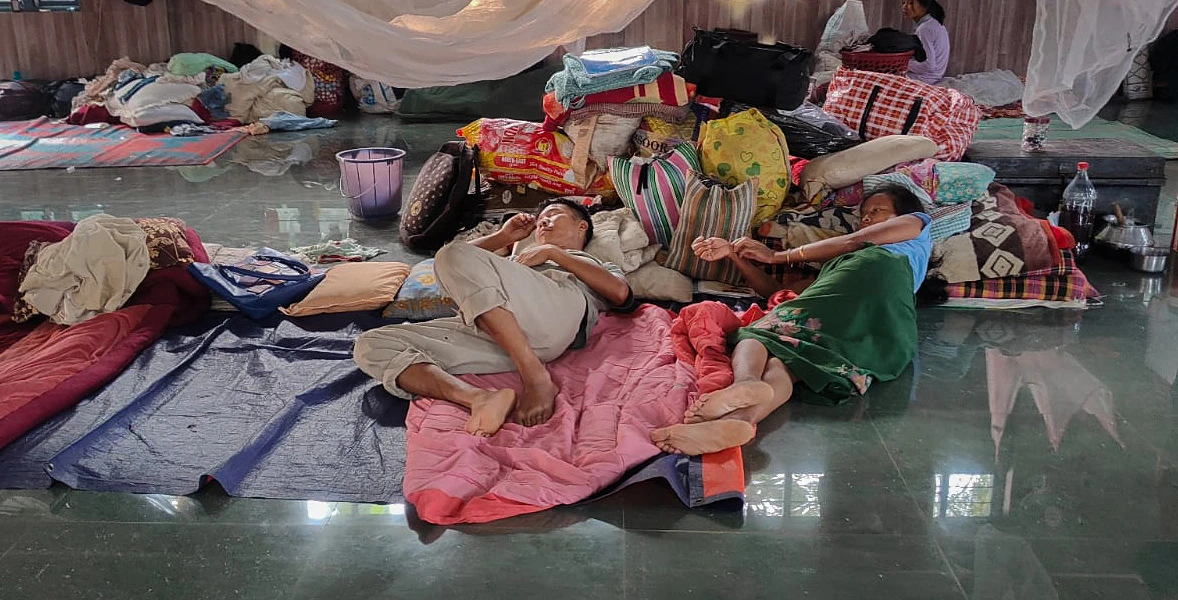
Christians in Manipur face humanitarian crisis as violence crosses 6-month mark
The Christian Kuki-Zo community in Manipur is in the throes of an escalating humanitarian crisis. Communal tensions lasting more than six months have resulted in widespread violence, leaving at least 146 dead and displacing over 41,000.

The conflict in the northeastern state ignited on May 3 following a divisive court directive. The order proposed extending special economic benefits and quotas to the majority Meitei Hindu populace—benefits previously exclusive to the tribal Kuki-Zo people. Moreover, the proposed change would permit Meitei purchases of land in historically Kuki-Zo territories.
The sustained violence has not only shattered lives but also infrastructure. Over 7,000 Christian homes and 350 churches have been razed. As the displacement persists, conditions worsen, with many fatalities including children.
Lack of medical care
Mary Beth, a volunteer in the Kuki-Zo district of Churachandpur, also known as Lamka, told CSI that inadequate medication and poor sanitation have led to the deaths of at least 53 displaced individuals, including numerous children, in the district.
The district of Churachandpur is home to 112 relief camps, providing shelter to around 20,000 displaced persons.
Beth attributed the fatalities largely to pre-existing health conditions, notably asthma, cancer and diabetes. She believes these individuals could have survived given access to proper medical care and specialists.
Specialist doctors, all of whom were Meitei, left the district after the onset of violence on May 3. According to Beth, wealthier families sought medical attention in other states, leaving those without financial means to seek refuge in Churachandpur.
Sleeping on the ground
Beth said that around 60 percent of the displaced people have been sleeping on the ground for over six months. Despite families averaging four members, the government has provided only one blanket and mattress per family unit.
The rainy season is making the already poor living conditions worse. Floors are wet, and the health of asthmatic children is worsening. Other children are experiencing colds and fever. Additionally, a number of children have died following a measles outbreak.
The local government hospitals, which have run out of the necessary medicines and equipment, are depending on non-governmental organizations for supplies, Beth said.
Signs of trauma
The violence has also precipitated a mental health crisis among the Kuki-Zo community, including those indirectly affected, with widespread reports of anxiety, depression, sleep disturbances and nightmares. Some breastfeeding mothers are experiencing acute fear and appetite loss, Beth pointed out.
Children, too, are showing signs of trauma. There are fifty day schools offering group activities for these children, Beth said.
She recounted the story of a three-year-old boy in her care who constantly draws images of blood, guns and airplanes. Another child persistently shouts “no” if you ask anything.
Like many volunteers, Beth admits to struggling with her own psychological health amidst the crisis.
With winter on the horizon, there is a pressing need for warm clothing among the displaced, Beth said. The crisis began in May’s peak summer, leaving many without appropriate attire for the colder months ahead.
Rising tensions
Tensions are now rising again after a Meitei police officer was fatally shot by a suspected Kuki-Zo sniper on October 31 in the town of Moreh near the Myanmar border. Violence from Meitei extremists and law enforcement followed, targeting Kuki-Zo communities. Reports detail brutal assaults on women and girls, men beaten and rampant looting.
In the wake of the attacks, hundreds have sought refuge near the local base of the Assam Rifles paramilitary force, known for its neutrality amid rising hostilities.
Despite the presence of the army, daily assaults persist. Meitei women blockade key routes, severely curtailing military intervention capabilities and allowing the violence to continue unimpeded. Young Kuki-Zo residents have resorted to arms in a desperate bid to defend their homes. The local police force is known to be biased against the Kuki-Zo community.
UN and EU interventions
In September, UN experts issued a statement on Manipur. “We are appalled by the reports and images of gender-based violence targeting hundreds of women and girls of all ages, and predominantly of the Kuki ethnic minority. The alleged violence includes gang rape, parading women naked in the street, severe beatings causing death, and burning them alive or dead,” the experts said.
“It is particularly concerning that the violence seems to have been preceded and incited by hateful and inflammatory speech that spread online and offline to justify the atrocities committed against the Kuki ethnic minority, particularly women, on account of their ethnicity and religious belief,” they said.
In July, the European Parliament passed a resolution urging the Indian government to urgently restore peace in Manipur.
“There have been concerns about politically motivated, divisive policies promoting Hindu majoritarianism, and about an increase in activity by militant groups,” the resolution stated. There are also “accounts of partisan involvement by security forces in the killings have increased distrust in the authorities.”
As the conflict marked its six-month point on November 3, the Kuki-Zo Christians of Manipur remained mired in a profound and worsening humanitarian crisis, with the spectre of further violence looming large over their shattered lives and homes.





